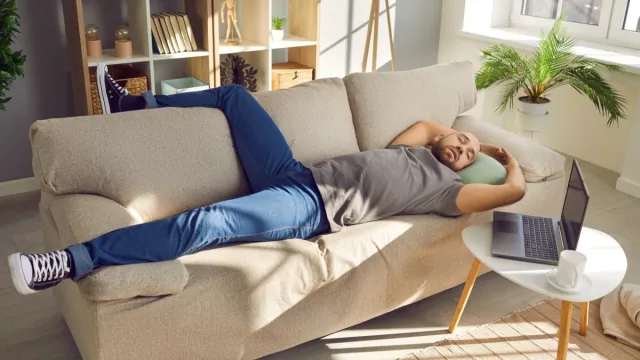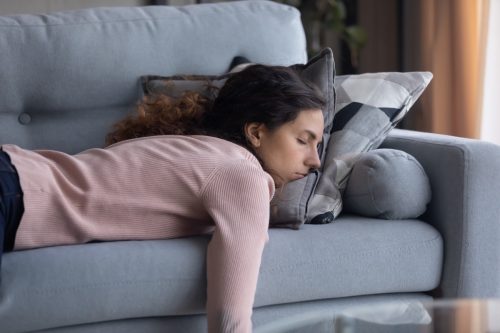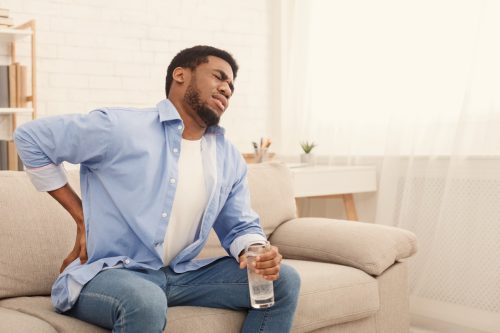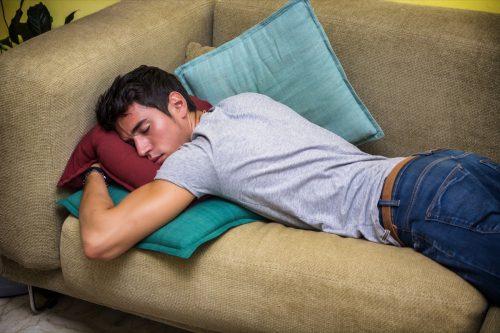What Happens to Your Body If You Fall Asleep on the Couch, According to Doctors
We've all done it—but is it hurting our health?

Getting plenty of good quality sleep is essential to our health and overall well-being—we all know this. But who hasn't dozed off on the sofa while trying to catch up on the last season of Succession (or your binge-watch of choice)? It may seem harmless, but doctors say that if you regularly fall asleep on your couch, you could be doing damage to your body. "Everyone loves to sleep on the couch, perhaps while watching TV," says orthopedic surgeon Brian A. Cole, MD, FAAOS. "However, there is a trade-off in terms of support of the neck and low back."
Chester Wu, MD, who is double board-certified in psychiatry and sleep medicine, agrees. "Your couch is unlikely to provide you with the spinal support, pressure-point relief, and temperature support that your mattress can," he tells Best Life.
Just how bad is this habit for your health? Read on to find out what happens to your body when you snooze on your sofa—and how to make the most of your naps, wherever you take them.
READ THIS NEXT: If You Sleep in This Position, You Could Be Hurting Your Spine, Experts Warn.
How bad is it to fall asleep on the couch?

"Couches are not designed for sleeping and lack the proper support you need to maintain a healthy spinal alignment throughout the night," says Randa Jaafar, MD, a pain management specialist and anesthesiologist who has worked specifically with patients who suffer from back pain.
The spine is made up of four curves, the cervical and lumbar curvatures which make the shape of a C, and the thoracic and sacral curvatures which form more of a backwards C.
"The organization of the spine is like a Yin and Yang, a dynamic balance of opposing but complementary and interconnected forces, known as chi," says Cole. "One curve leads into the next. It is important to maintain this balance by supporting the spine. While you may think that a couch is comfortable as you sink into it, the reality is that you're no longer supporting the curves of your spine."
READ THIS NEXT: I'm a Pharmacist, and This Is the Sleep Aid I Recommend.
How sleeping on your couch affects your spine.

Though it may feel so good to succumb to your heavy eyelids and let yourself drift off while reading a book or watching a movie, your couch does not offer proper support for your resting body and can leave you feeling stiff when you wake up.
"When you fall asleep on the couch, your body gradually relaxes and your muscles become less tense," says Jaafar. "This can result in uncomfortable sleeping positions that may strain your back muscles and eventually cause pain."
It's certainly nice to sink into a soft sofa, but it isn't so great when it comes to sleeping. Sherry McAllister, MS(ed), DC, president of the Foundation for Chiropractic Progress, explains that your spine—which, as noted above, is made up of intertwining C-curves—should not itself resemble a C.
"Your spine forms a 'C' shape as a result of the soft fabric on your sofa, which is why you may have back pain after lying down on it," she says. "When you wake up, the lack of support may leave you feeling stiff and uncomfortable."
Doing these things can make your couch nap-friendlier.

As long as you avoid overly awkward positions, Jaafar says catching a quick catnap on the couch is probably not going to be an issue. It's the falling asleep at night and waking up four hours later, or even in the morning, that is more cause for concern. Wu concurs, saying, "If you find the couch a comfortable place to sleep for a short amount of time, and you don't wake up with any neck or back pain, the couch might be nap-safe."
But even so, there are ways to make napping on the couch easier on your body. McAllister recommends sleeping on your back if your couch is long enough. "Your weight will be distributed more evenly as a result, making you less prone to toss and turn during your nap," she tells Best Life.
For those who can't sleep on their backs, it's important to find a position that allows for the natural curvature of the spine—and to keep your head and neck supported. "The strategic use of pillows can help," says Wu.
If you're a back sleeper, he says to elevate your knees with a pillow to help align your spine. If you sleep on your side, place a pillow between your knees. In either position, Wu suggests also using a pillow to support your neck. If you don't have the right-sized pillow, Jaafar says a rolled-up towel can do the trick.
For more health news sent directly to your inbox, sign up for our daily newsletter.
How long you nap matters.

It's good to keep your naps—on the sofa or elsewhere—on the shorter side. "If you do decide to nap on your couch, try to nap for no more than 20 to 30 minutes," says Jaafar.
McAllister agrees, saying that "sleep inertia, often known as 'sleep drunkenness'—that state of sluggish bewilderment that many of us are all too familiar with—can be brought on by waking up while in a deep sleep phase." She recommends sleeping for less than half an hour—or going ahead and taking a marathon nap. "You should try to awaken before deep sleep starts (usually before the 30-minute point), or sleep for the entire 90-minute REM cycle," she says.
Wu also advocates brief naps, and adds a word of warning about the timing of your snooze: "To avoid disruptive post-nap grogginess, cap your nap at 20 minutes and don't nap too late in the day. A longer and later nap has the potential to disrupt that night's sleep."





















